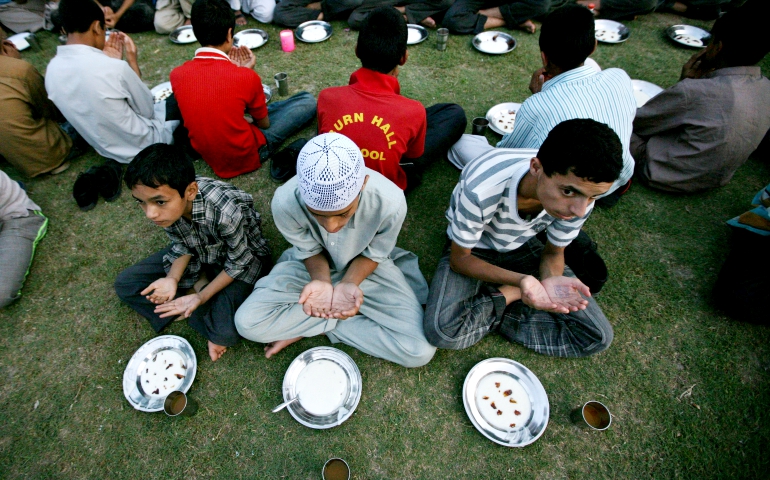
Muslim boys pray as they wait to end their fast of Ramadan in Srinagar, India. (CNS/EPA/Farooq Khan)
Every year when the Muslim holy month of Ramadan rolls around, I stand in awe of my Muslim sisters and brothers. The fast that Muslims observe during Ramadan is so much more stringent than anything we Catholics do for Lent, or were ever required to do. It boggles my mind — not to mention my digestive tract.
For those who may not know, the observance of Ramadan requires that Muslims refrain not only from eating but even from drinking water during all the hours of daylight for the entire 30-day period. This observance, which began at the end of May this year, commemorates the period when the Quran was first revealed to Prophet Muhammad. Eating is permitted only during the hours of darkness.
Muslims also refrain from smoking and engaging in sexual relations during Ramadan, and are taught to refrain from sinful behavior such as insulting, backbiting, cursing, lying and fighting.
In spring and summer months, those daylight hours of fasting must seem endless! Granted, there is typically a grand meal after sundown, called an iftar, but people are really hungry at that point, not having eaten all day long. I have been a part of iftars, the meal that breaks the fast, and everyone savors the dates that typically begin that grand meal.
By contrast, the Catholic observance of fasting and abstinence during the season of Lent is mild. When I was growing up, the church required that Catholics eat only one full meal a day on weekdays during Lent, preferably around noon. Two light meals were permitted at other times as long as those two combined meals were less than a full meal. In other words, there was one meal and two snacks. Drinking water was never a problem.
Today, the requirement for fasting on all the weekdays of Lent has been dropped entirely. Fasting like that in the old days is required only on Ash Wednesday and Good Friday. Abstinence from meat is practiced only on the Fridays of Lent. And although fasting and penitential practices are recommended all during Lent, they are no longer required.
So fasting for Catholics is not even remotely close to what fasting means for Muslims during Ramadan. Eating one full meal, meatless or not, is far different from not eating at all. And being able to consume liquids is far different from going thirsty as Muslims are required to do.
Compared with the Muslim approach, where nothing passes one's lips — solid or liquid — all day long, the Catholic approach is downright tepid.
Still, both practices exist as a reminder that there is something more important than the material in life — something, indeed, Someone more significant than food. Someone larger than life, and indeed, beyond human life.
And so, I wish a blessed Ramadan to our Muslim sisters and brothers.


